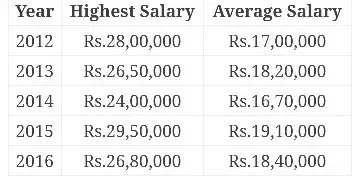Pilot Salaries in India: An Introduction
Piloting is a prestigious and sought-after profession globally, and India is no exception. Pilots play a crucial role in ensuring the safe and efficient operation of aircraft, and their salaries reflect the responsibilities they shoulder. In India, pilot salaries vary widely based on several factors, including experience, type of aircraft flown, employer, and location.
Factors Influencing Pilot Salaries
1. Experience
Experience is a significant determinant of pilot salaries. Newly licensed pilots, often referred to as first officers or co-pilots, typically earn lower salaries compared to their more experienced counterparts. As pilots accumulate flight hours and gain seniority, their salaries tend to increase.
2. Type of Aircraft
The type of aircraft a pilot operates also impacts their salary. Captains or pilots-in-command flying larger, more complex aircraft such as wide-body jets generally command higher salaries than those operating smaller regional aircraft or helicopters.
3. Employer and Location
The airline or aviation company employing the pilot and the geographical location of their base also influence salary levels. Major airlines tend to offer higher salaries and better benefits than regional carriers or charter companies. Additionally, pilots based in metropolitan areas or aviation hubs may receive higher compensation due to the higher cost of living.
Salary Range for Pilots in India
Pilot salaries in India can vary significantly depending on the factors mentioned above. As of recent data, the average monthly salary for entry-level pilots (first officers) in India ranges from ₹1.5 lakhs to ₹3 lakhs. Experienced captains flying for major airlines can earn anywhere from ₹5 lakhs to ₹12 lakhs or more per month, including various allowances and bonuses.
Career Progression and Salary Growth
Pilot salaries in India tend to increase steadily with experience and career progression. As pilots gain seniority, they may have the opportunity to upgrade to captaincy roles, which come with higher salaries and additional perks. Furthermore, pilots with specialized skills or qualifications, such as type ratings for specific aircraft or certifications for flying in challenging conditions, may command premium salaries.
Outlook for Pilot Salaries in India
The aviation industry in India continues to grow rapidly, driven by factors such as increasing air travel demand, fleet expansion by airlines, and government initiatives to boost aviation infrastructure. As the industry expands, the demand for qualified pilots is expected to remain strong, potentially leading to improved salary prospects and career opportunities for aspiring aviators.
Conclusion
Pilot salaries in India vary based on factors such as experience, type of aircraft flown, employer, and location. While entry-level salaries may be modest, experienced captains flying for major airlines can earn substantial incomes. As the aviation industry in India continues to evolve, pilot salaries are likely to reflect the growing demand for skilled aviators. Understanding the dynamics of pilot salaries is essential for individuals considering a career in aviation and for those already navigating the skies.
 Salary per Month Land the job you deserve
Salary per Month Land the job you deserve



